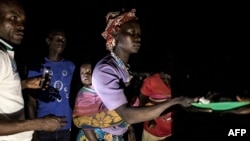The U.N. refugee agency and partners are appealing for $1.3 billion to assist more than two million South Sudanese refugees and five major countries hosting them — Ethiopia, Kenya, Uganda, Sudan and the Democratic Republic of Congo.
After seven years of conflict, South Sudan has formed a Transitional Government of National Unity and appears to be on the cusp of peace. But the new government faces many challenges.
One of the biggest is finding solutions for millions of South Sudanese who have been forcibly displaced by years of conflict, both internally and as refugees. In the meantime, the U.N. refugee agency says some 2.2 million refugees and the countries hosting them continue to depend upon international support to provide them with life-saving assistance.
UNHCR spokesman Babar Baloch told VOA many thousands of refugees who have returned to South Sudan on their own initiative are stuck in limbo in their home country. He says most of those who remain outside the country are in no rush to return. They are waiting to see if peace holds.
"The 270,000 South Sudanese that have returned in the past couple of years or more, the majority of them have not been able to return back home. You are talking a big number -- probably 70 percent or more. And, in many areas, access still remains a challenge in terms of the humanitarian work," he said.
Baloch said humanitarian workers and the South Sudanese displaced are hoping that the new political developments translate into long-lasting peace.
In the meantime, the UNHCR says funding is urgently needed to provide emergency care for the refugees including food, shelter, safe drinking water and health care. It notes money also is needed to care for 65,000 unaccompanied children and action on sexual and gender-based violence.
The agency says many refugees are missing out on education and the gap must be closed. It says refugees must be trained in the skills they need to provide for themselves and their families.




